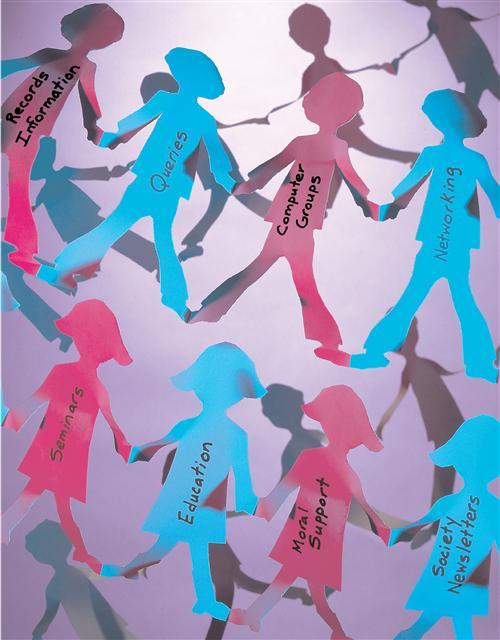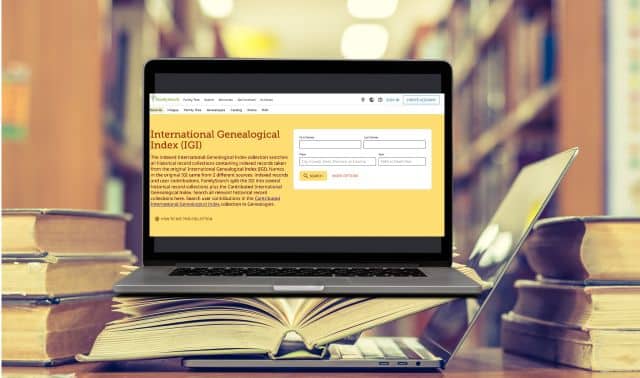
It started one day when I was reading microfilm at my Family History Center (a branch of the Church of Jesus Christ of Latter-day Saints’ Family History Library <www.familysearch.org> in Salt Lake City). A note in the margins spelled it out in black and white: John and Lydia Ann Hendrickson were buried in Reed Cemetery, Cass County, Mo. Wow!
Following a year of fruitless efforts to pinpoint the cemetery’s exact location from my San Diego home, I got in my car and headed east. I was determined to see my family’s resting place. Fortunately, Jo Ann VanMeter, president of the Cass County Family History Guild <www.orgsites.com/mo/casscountygenealogicalsocietyinc>, had read my online posting about the trip and set her cohorts into action.
Marian Schlicher, researcher extraordinaire, found Reed Cemetery on a farm, and used local historical society records to verify John Hendrickson’s burial there. After she learned that waist-high weeds, fallen trees and absolute neglect had made the little cemetery impossible to navigate, the guild gang uncovered my ancestors’ graves with an armful of chain saws and a huge dose of dedication.
Several guild members escorted me to Reed, and I was stunned by the enormous task they’d undertaken. Most of the gravestones were overturned or buried in debris, and we still had to scramble through weeds and over branches. The gang let me explore until I found John’s tombstone lying in a long furrow. And although Lydia wasn’t listed in the cemetery index, her stone was there, too, on its side and covered with leaves. The inscription told me what I’d always wondered — Lydia died March 7, 1871, and since she was buried with her infant, she probably died during childbirth.
Nothing comes close to matching the joy of that day — it wasn’t just discovering long-lost graves, but also experiencing the Cass County guild’s kindness to a fellow researcher. I joined their group on the spot, and they continue to help me with research leads. Belonging to a genealogical society can be a big boost to your family search, too.
Living la vida local
Local societies — specific to a city, town or county — are where it’s happenin’, genealogically speaking. These groups range in size from a few members to hundreds, and they might meet in a community building or have their own headquarters. My local San Diego Genealogical Society <www.rootsweb.com/~casdgs>, for instance, has its own library with thousands of volumes, as well as subscriptions to popular family history magazines and newsletters. It’s always free and open to members; the general public can use it one day a week or by appointment.
Camaraderie is one of the most enjoyable membership benefits: You’ll find research buddies to help celebrate discoveries and offer moral support when you’re up against a brick wall. Be sure to take advantage of meetings — usually, they’re monthly — where you’ll connect with other members and get expert research lessons on local sources. Societies also might sponsor conferences or family history fairs where you can gain even more know-how. Other educational benefits might include workshop discounts, tours of research facilities or historical sites, and group trips to a genealogical mecca such as the Family History Library. Some societies have special-interest groups on computers, research topics, geographic areas and the like.
As a member, you’ll likely receive a quarterly or bimonthly newsletter and the perk of publishing queries in it (or on the society’s Web site). These newsletters often contain society members’ transcribed records. Several years ago, Leo Jane Shore, then-president of the Kansas City, Mo.-based Heart of America Genealogical Society, contributed histories of local churches along with members’ names and membership dates to that organization’s newsletter, Heartlines.
In fact, many societies transcribe, publish and sell records to raise funds. For example, the Lycoming County Genealogical Society <members.aol.com/LCGSgen/book.htm> in Pennsylvania sells more than 20 publications, including local histories and compilations of funeral and burial records. Farther south, North Carolina’s Surry County Genealogical Association <juliemorrison.com/surry> offers collections of local trivia, old recipes and biographies, as well as local church histories. Where else are you apt to find such treasures?
Even if, like me, you live hundreds of miles from your ancestral hometown, consider joining that area’s society. Its members likely know where to find all kinds of local records — those of funeral homes, justices of the peace, marriages, births, cemeteries, censuses, wills, deeds, pioneer biographies, newspapers and early histories. (What you need may even be on the shelves at the group’s library.) As my experience with the Cass County society shows, some volunteers will go to the historical society or courthouse and duplicate records for just copy costs and postage — out of pure genealogical kindness. The locals also might delve into your family research for a minimal fee or hook you up with a good professional.
Sometimes, if members know you’re researching a specific surname, they’ll contact you when information surfaces. One long-distance member of the Lucas County, Iowa, society <www.iowagenealogy.org/counties/lucas.htm> actually received an original deed from local cohorts who spotted its connection to her surname. You might even encounter a cousin who’s working on your tree.
Broadening your horizons
Somewhat larger than their local counterparts, state and regional genealogical societies generally have libraries with invaluable research materials relating to their geographic areas. Members typically get a magazine with record transcriptions, genealogical case studies and other how-to articles. For example, if you belong to the Maryland Genealogical Society <www.mdgensoc.org>, you’ll receive the quarterly 120-page BULLETIN containing resources such as family charts, public records and historical essays. Back issues contain tidbits such as family Bible notations, county marriage certificates, passenger lists and cemetery transcriptions.
Like local groups, state and regional societies might send you a newsletter, such as the New England Historic Genealogical Society’s (NEHGS) <www.newenglandancestors.org> Great Migration, which features articles, book reviews and NEHGS members’ research queries (you’ll probably be able to submit a limited number of queries for free). Since they’re relatively large, state and regional groups also host annual conferences, sponsor transcription projects and maintain searchable online databases. The Missouri State Genealogical Association Web site <mosga.missouri.org> outlines all the surnames ever mentioned in the group’s quarterly journal, and the Wisconsin State Genealogical Society <www.wsgs.org> maintains a database of “delayed and affidavit” births prior to 1907. Florida’s society <www.rootsweb.com/~flsgs> uses its Internet site to track transcription projects including the 1935 Florida census, a Hernando County marriage book and the Leon County voter lists from 1829 to 1832.
History Lessons
Genealogical societies occasionally double as historical societies, but you’ll find plenty of places that have both types of groups. Historical societies tend to focus on general history — so they have great resources for fleshing out your ancestors’ lives — but many hold genealogical treasure troves, too. Some state historical societies even manage the government’s archives. Minnesota’s society <www.mnhs.org>, for example, has state and federal census records; naturalization documents; information on patriotic, fraternal and veterans organizations; township histories; cemetery records; city directories; and records of the Great Northern and Northern Pacific railroads.
Local historical societies often have papers, diaries or belongings of early pioneer families or prominent citizens, and they’re an excellent source for photographs and maps. The San Diego Historical Society <www.sandiegohistory.org> owns more than 2 million photos, some dating back to 1860, and 2,000-plus maps, including the Sanborn fire-insurance series.
If you can’t visit a historical society in person, see if you can request a quick lookup (usually limited to a half-hour or so) for free or a small fee. You may be referred to a professional researcher who’s familiar with the society’s archives. Find your state’s society using the US State Historical Societies & State Archives Directory <web.syr.edu/~jryan/infopro/hs.html>.
The Genuine Article
You read each issue of your society’s newsletters cover to cover for mentions of your ancestors — but what if their names were splashed across four pages way back in the spring 1978 edition? You may be able to get a copy of the article using the Periodical Source Index (PERSI), a subject index to 1.6 million genealogical and historical articles that have appeared in English-and French-language magazines and journals since 1800.
You can search PERSI online for free at a library that subscribes to HeritageQuest Online <www.heritagequestonline.com> or by subscription to Ancestry.com <Ancestry.com >. Look for your family’s surnames and places they lived. If you find articles of interest, you may be able to get the periodical from your local library, through interlibrary loan or by writing the society that published it. You also can order copies for a fee from the Allen County Public Library <www.acpl.lib.in.us/database/graphics/order_form.html>, which created PERSI.
Networking with fellow society members gives you leads on researchers-for-hire who specialize in the area. Rates vary, but it’s not unusual to find someone who will search local records for as little as $10 or $15 an hour. For $40, I hired an Iowa researcher to copy census, land and marriage records, and check cemetery and probate files for me.
If your ancestors were among the first to put down roots somewhere, you may be able to get a pioneer or early settler certificate from the state society. Requirements vary, but you’ll probably have to prove you descend from people who lived there prior to statehood or some other milestone date. Members who’ve already documented their ancestors are probably listed on the society Web site.
Membership in a larger organization tends to cost a little more. NEHGS, one of the country’s best-known regional organizations, claims more than 20,000 members worldwide. A one-year research membership costs $75, but the benefits include access to essential New England resources in dozens of online databases and a 30,000-volume lending library. An individual annual membership to the Minnesota Genealogical Society <mngs.org> costs $30; the Ohio Genealogical Society <www.ogs.org>, $32; and the New York Genealogical & Biographical Society <www.newyorkfamilyhistory.org>, $60. Check the groups’ Web sites or call to ask about discounts for joint or multiple-year memberships.
Facing the nation
No matter how long you’ve been climbing your family tree, there’s always something new you can learn. Two of the best-known national groups — the National Genealogical Society (NGS) <ngsgenealogy.org> and the Federation of Genealogical Societies (FGS) <fgs.org> — will help you add new skills to your bag of research tricks.
NGS, founded in 1903, encourages members to expand their family history know-how through online classes, research standards, a how-to magazine and a quarterly journal with genealogies and case studies. Its annual “Conference in the States” — open to nonmembers, too — features seminars by top professionals and an exhibit hall where you can try out software and Web sites, buy books and supplies, and investigate genealogical organizations. This multiday event happens in a different city each spring. Topics range from genetic genealogy to Union Civil War records held by the National Archives and Records Administration. Registration costs $210 for members, $245 for nonmembers or $95 for a single day. An NGS membership runs $55 annually.
FGS actually is an umbrella organization for genealogical societies — you don’t sign up as an individual researcher, but if your local society joins, all of its members share the benefits. Those include the FORUM, a quarterly magazine with how-to articles, book reviews and an international-research column. (You can subscribe to the FORUM for $18 per year if your society doesn’t belong to FGS.) The organization also hosts an annual conference.
Staying focused
If you’re seeking resources specific to your family’s heritage, look for a society that concentrates on an ethnicity, religion or country of origin. The Afro-American Historical and Genealogical Society <www.aahgs.org>, for example, helps African-American researchers confront the unique challenges of tracing enslaved ancestors. The Jewish Genealogical Society <www.jgsny.org>, headquartered in New York City, provides information on one-of-a-kind records such as Yizkor books. Got Quaker roots? Try the National Society Descendants of Early Quakers <www.terraworld.net/mlwinton>.
Other groups specialize in tracing ancestors to particular geographic regions, such as the Czechoslovak Genealogical Society International <cgsi.org> for people with Czech, Bohemian, Moravian, Slovak, German, Hungarian, Jewish, Rusyn and Silesian roots. Depending on your family’s cultural background, you could join the Italian Genealogical Group <www.italiangen.org>, the Society for German Genealogy in Eastern Europe <www.sggee.org> or the Society of Hispanic Historical and Ancestral Research (SHHAR) <members.aol.com/shhar> (or all three). SHHAR did away with its membership fees a few years ago; the other groups named here hover at $20 to $30 per person in annual dues.
People whose families migrated together have established societies such as the Muttenz Descendants <muttenzdescendants.org>. All the members descend from 120 emigrants who left Muttenz, Switzerland, in the 18th century and settled in Pennsylvania and North Carolina. Benefits of such a membership are primarily educational — the organization may be your best resource for learning about peculiar naming conventions, name changes and the main avenues of immigration.
Feeling special
No matter how unusual your genealogical bent, odds are there’s a group for it. Consider these types of societies, which emphasize single research topics:
• Surname: Some surname societies investigate all instances of a name wherever it occurs (these are called one-name studies). Other such organizations want to learn everything possible about one person’s descendants or several family branches. For example, the Austin Families Genealogical Society <www.austins.org>, has 600 members around the world researching ancestors named Austen and Austin. A year’s membership costs $12 for US residents and $14 for others.
Family associations, such as the Muchmores’ <www.muchmore.org>, are surname societies whose members have filed the legal paperwork necessary for official association status. When you’re really stuck on a family branch, joining a surname society can provide you with a network of researchers who’ve already climbed over your brick wall, or at least can give you a boost.
• Lineage: If a distinguished ancestor sits in your tree, you may be eligible to join a lineage society. These elite groups require you to prove you’re linked to an ancestor who fits certain qualifications. The Daughters of the American Revolution <dar.org>, for example, is for female descendants of “patriots” who helped the United States win independence. You can join the National Huguenot Society <www.huguenot.netnation.com> if a Huguenot ancestor either stuck it out in France despite persecution, or emigrated between Dec. 10, 1520, and Nov. 28, 1787. Other lineage groups admit the descendants of soldiers who fought in a certain war or military unit. Typically, you send a fee with your membership application, then once you’re in, you pay dues to a local chapter.
Were your ancestors more notorious than notable? Consider looking into the free International Black Sheep Society of Genealogists <blacksheep.rootsweb.com>.
• Computer genealogy: These groups host mailing lists and plan seminars on using computers in your genealogical search — that includes general tips, family tree software and Internet research. The Silicon Valley Computer Genealogy Group <svpafug.org>, for example, hosts monthly meetings, publishes a newsletter, offers training sessions and posts free tutorials on its Web site. Membership costs $15 annually ($20 with a copy of the society’s book Family History Documentation Guidelines).
See whether your local genealogical society has a computer-focused “special-interest group” (SIG for short), such as the Marin County (Calif.) Genealogical Society’s Computer Interest Group <www.maringensoc.org/Organization/cig.htm>. SIGs are open to any society member.
Hunting clubs
Start your search for a local genealogical society by flipping to the Associations or Societies listings in your telephone directory. If you come up empty, try asking the area’s historical society. Internet-savvy folks can type terms such as jefferson county tennessee genealogical society or hiawatha kansas genealogy into a search engine such as Google <www.google.com>. Visit <www.familyhistory.com/societyhall> to search for FGS-member societies by group name, city, state and ZIP code. Also try USGenWeb <www.usgenweb.com>: Choose your state from the left side of the page, then look for a link to organizations. Societies also may be listed on that state’s county pages. Internet search engines work well for finding ethnic and special-interest societies, too, or check Cyndi’s List. Go to <www.cyndislist.com/soc-gen.htm> for ethnic, religious and military groups or <www.cyndislist.com/surnames.htm> for surname societies and family associations.
Taking advantage of opportunities to be an active society member will reap you the most rewards. You may not be able to wield a chain saw in an overgrown cemetery, but you’ll find plenty more ways to participate — going to meetings, editing the newsletter, planning seminars or volunteering for record-transcription projects. The Durham-Orange Genealogical Society of North Carolina encourages its members to transcribe tax records, deeds, wills, letters and Bible records, and to extract genealogical material from old newspapers and census records. Fund raising is a constant necessity, so help out with book sales, family history fairs and public relations. Technologically blessed members can maintain the society’s Web site and answer e-mails.



